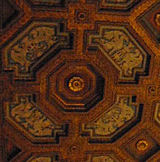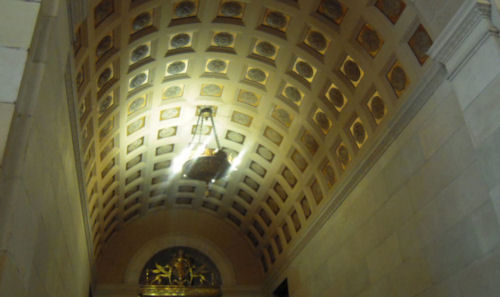




Since she had all these words at her disposal, the little sprite began to assign specific meanings to each. Ownership, referred to in the previous page, acquired overtones of distance, an absentee landlord, perhaps, as opposed to possession. There is nothing detached or distant about possession.
Flowers might bloom and blossom; blooms and blossoms have already flowered. Idiots are blooming; casual acquaintance does, or does not, blossom into a close affinity that seems preordained.


In any event, the new conjoined language begins to spread itself out, to travel the world. And now our story acquires the essential identifying marks of a genuine Fairy Tale — which is to say sets out on a transformative journey that ends happily ever after, for itself, in any event.
It's almost as though English, entirely the product of a collective subconscious, decides that its destiny is to be Goldilocks, travelling about, entering uninvited, making itself at home wherever it wishes, and helping itself to generous portions of whatever is on the table. And when it finds that bowl of porridge which is just right, eating it up entirely.
Then it tries all the chairs, and if the smallest gets broken in the process, that's just too bad. And finally, it gets into all the beds and finding the biggest bed too hard, and the next too soft, it moves on to the last, and smallest, which happens to be just right. And there Goldilocks falls asleep.
The dénouement of the story, which children can never hear often enough, has the Bear family returning home. Papa and Mama Bear announce that someone has been eating their porridge, sitting in their chairs, and lying in their beds, while Baby Bear discovers that the culprit has not only eaten his breakfast, broken his little chair, but is at that precise moment lying in his little bed.
I can't for the life of me remember what happens next, and how the official version ends, perhaps because there's something not quite right about this Fairy Tale. Is it because the purported heroine is not the focus of our sympathetic attention, that role belonging to Baby Bear? Or because the detail lacks the usual evocative depths we associate, for example, with Jack and the Beanstalk, which also deals with break and enter and criminal disregard for the rights of others? Or could it be unsettling because the story doesn't end happily ever after? In fact, it doesn't end at all.
And yet there is something about Goldilocks the Fairy Tale that rings only too familiarly in English ears.
Fairy Tales are pure narrative; Goldilocks, on the other hand, is more descriptive of a situation, rather like Myth, or a Nursery Rhyme that doesn't — rhyme, that is.
It's said that Nursery Rhymes began as subversive parodies of events prevailing at a time when forthright criticism might cost a storymaker his head. Might it be possible that certain colonised peoples, bullied into adopting an unwanted language as its own, took refuge in expressing disdain for the language, to say nothing of the cooking, of the English?
Take the ugly word porridge, which is inextricably linked to greedy Goldilocks. Why couldn't the tale be about cereal, with its hints at accompaniments of cream and brown sugar? But no, porridge is all of a kind with spotted dick and toad in the hole and other horrors linguistic in the Anglo-Saxon gastronomic world.
And perhaps the broken chair pokes fun at a perceived lack of gracefulness? But such is the sense of humour — and arrogance — of the English, might they not enjoy the story even whilst recognizing themselves as objects of saturnine mockery?
And then there's Goldilocks fast asleep in Baby Bear's little bed. Don't tell the children, but I think she's there still.
Because at this point the English language is best compared to Star Trek's 'The Doomsday Machine', roaming the universe in search of any living idea that can be sucked into its gaping voracious fiery maw and used as fuel to power an autonomous self-directed campaign of linguistic exactitude. (This particular episode of Star Trek is notable for the crudeness and lack of technical proficiency in its depiction of the ravenous monstrous cigar-like object, and yet the image is no less chilling for all its primitive special effects.)
What the English Doomsday Machine is after is that particular word or phrase that will serve to fill a void in its vocabulary. And every other language has to be ransacked and pillaged of its most sacred and meaningful concepts so that English can appropriate them for its own uses.
And once it has taken those words under its control — which is to say, changed the pronounciation to something that no longer sounds foreign to its ears — English then begins the process of altering the meaning of the concept so that it belongs no longer to the originating language.


Occasionally, English will leave le mot juste just as it is, not because it lacks the capacity to invent a word or phrase to mean schadenfreude, or hors de combat, but in order that the meaning remain the property of the host language, and therefore free from the ongoing temptations of corruption, substitution, and overall contamination.
Except that a host language will never be exempt from corruption and contamination, not while The Doomsday Machine remains free and unfettered to pursue its single-minded attack. And herein lies the ultimate irony: no other language has been ravaged to the extent that English has caused devastation to the family of its invading Norman ancestor.
For the sprite has exacted a slow and terrible revenge, no less dreadful for being completely unplanned, spontaneous. Though seemingly accepted with ready obedience, those Norman organising concepts and abstractions have found their meanings changed with no regard for coherence and faithfulness to their latinate roots. Which might be a minor inconvenience for a language from a faraway land, but is simply catastrophic for neighbours separated only by a mile or two of water.
Because after a while the innocent heirs and cousins of the Conqueror, who had remained in their own homes rather than invading their northern neighbour, began to realise that they had lost control of their most intimate belongings, which is to say their words. For every concept that has been altered across the channel, the innocent stay-at-homes have lost two words: the original meaning, and the new imposed monstrosity.
Meanwhile the despoilers have been joined by insensate hordes from faraway corners of the earth in a savage assault upon the beautiful but fragile Norman tongue: adding, altering, mangling, inventing, borrowing, and stealing words without the slightest regard to where a concept came from, or what it is supposed to mean, so long only as it works for the purposes at hand. A true linguistic abomination.
Laws have had to be passed, of course, and academies founded, or no one would know what anything means. Except that, as in the Star Trek episode, struggle seems only to increase the deadly attraction. And as the academics sit in their dusty chambers poring over actual meanings of single words and phrases, computer discs, files, boxes, cartons, freightcars awaiting their turn are beginning to pile up in the corridors and anterooms of the august assembly rooms ...
And where to find a Commodore Decker sufficiently foolhardy to take the first steps to destroy the marauding force from within? To say nothing of a Captain Kirk to finish the job?
* * * * *
Need it be mentioned that these webpages dealing with English are not history? — no dates to memorize, few place names, and little analysis of political forces at play.
'English!' is a story in the sense that the five works under study are stories, which is to say having its source in childhood Fairy Tale with the transformatory journey that for me is the hallmark of Fairy Tale, and adolescent Myth, a more static situation of coming to terms with the consequences of that earlier journey.
... And now that our feet have been set firmly on the road to Fairy Tale and Myth, why not continue a few miles more?
________________________